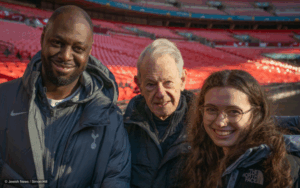Event Guidance
Your local HMD event could include any of the following elements:
- Create opportunities for individuals of different ages to come together and learn about the Holocaust, Nazi persecution and more recent genocides.
- Inspire young people to become active custodians of Holocaust remembrance – for example: Barnabas Balint has been an HMDT Youth Champion and organises an annual HMD conference to encourage and facilitate his peers to learn more about the Holocaust and recent genocides.
- Empower current and future generations to stand up against prejudice, hate, intolerance and discrimination in all their forms.
- Explore the long-lasting effects of the Holocaust on survivors and their descendants (inter-generational trauma).
- Research digitised archives.
- Visit a Holocaust Museum (in person or online).
Life stories that could be included in your HMD event
Anne Frank was just 15 years old when she died of typhus at Bergen-Belsen concentration camp. She, alongside countless other children, represent a generation of lives interrupted, taken too soon by the atrocities of the Holocaust. Read Anne Frank’s life story.
Peter Lantos BEM endured the horrors of Bergen-Belsen concentration camp where he lost most of his family. He later returned to his home country of Hungary where he suffered abuse at the hands of the communist government who had taken over the country. In spite of this, he earned a medical degree, eventually defecting to the UK.
Eva Clarke BEM was born under unimaginably harrowing circumstances in the final days of World War II. Her birth, on 29 April 1945, just outside the gates of Mauthausen Concentration Camp in Austria, came just one day after the Nazis had run out of gas for the chambers and less than a week before liberation.
Mala Tribich MBE was born in 1930 in Piotrków, Poland. Her early childhood was upended in 1939 when Nazi Germany invaded Poland and her family was forced into the Piotrków ghetto – the first Nazi ghetto established in Poland. She was then incarcerated at Ravensbrück concentration camp before being deported to Bergen-Belsen where she was eventually liberated by British forces in April 1945.
Li-Da Kruger, an award-winning filmmaker and producer, was born in Cambodia in 1975. She was evacuated from her homeland as a baby just days before the Khmer Rouge orchestrated the genocide that claimed over a million lives between 1975 and 1979.
Second, third and fourth generations
The impact of genocide doesn’t end with those who directly experience it but can ripple through the generations. The children and grandchildren of survivors often carry the weight of inherited trauma, shaped by the memories of conversations with parents and grandparents and the silence of those who came before them.
Avital Mendelsohn‘s grandfather, Yisrael Abelesz, survived Auschwitz Birkenau and was liberated by the Russian forces at the age of 14. For the past few years, Avital has been sharing his life story of survival, hope and resilience. She believes she’s continuing his legacy by educating others and encouraging meaningful discussion on how to create a more tolerant and empathetic world.
Contact Generation 2 Generation for more information about members of the second and third generations who convey the testimony of their relatives.
Baronita Adam is a member of the Roma community; she has spoken about the prejudice she has faced in her lifetime and about her mother’s memories of being targeted by the Nazis and imprisoned in a concentration camp.
Further reading and resources
- Generation 2 Generation
- Shoah Foundation
- Holocaust Testimony UK – AJR
- 80 Objects/80 Lives
- Ordinary Objects Extraordinary Journeys (OOEJ)
- My Home Town Project
Further reading
- The Diary of a Young Girl, by Anne Frank. Beginning on her thirteenth birthday, Anne’s diary traces her experiences of persecution and hiding from the Nazis in World War II.
- Night, by Elie Wiesel. An account of the author and his father’s experiences in Auschwitz and Buchenwald concentration camps.
- Yellow Star-Red Star, by Dr. Agnes Kaposi. A poignant memoir of Dr. Agnes Kaposi, sharing her experience through the outbreak of World War II and how a series of miracles and coincidences allowed her to survive.
- Holocaust Trauma and Psychic Deformation: Psychoanalytic Reflections of a Holocaust Survivor, by Alfred Garwood. A survivor of Bergen-Belsen, Alfred Garwood explores the massive psychic trauma suffered by a generation of Holocaust survivors.
- Parallel Lines: A Journey from Childhood to Belsen, by Peter Lantos. The journey of a young boy from a sleepy provincial town in Hungary through war-torn Europe to the concentration camp of Bergen-Belsen.
- Hitler, Stalin, Mum and Dad: A Family Memoir of Miraculous Survival, by Daniel Finkelstein. A deeply moving memoir about Daniel Finkelstein’s parents’ experience at the hands of two genocidal dictators of the 20th
